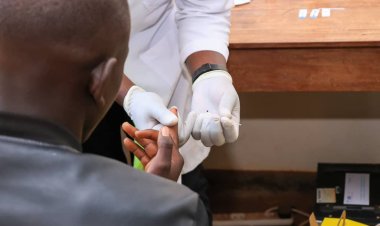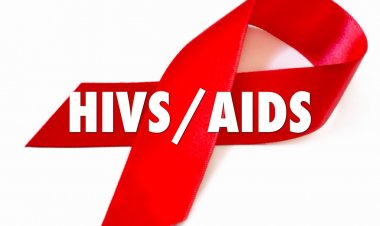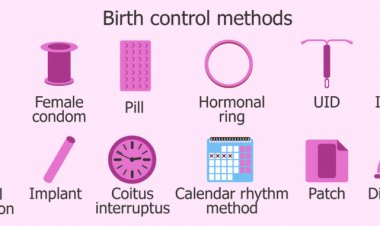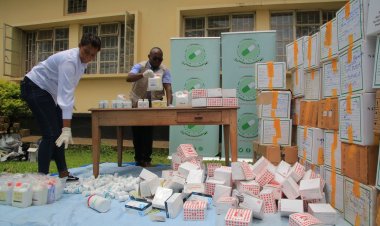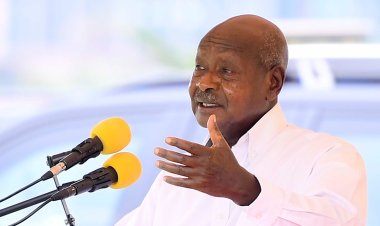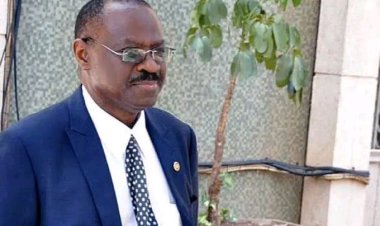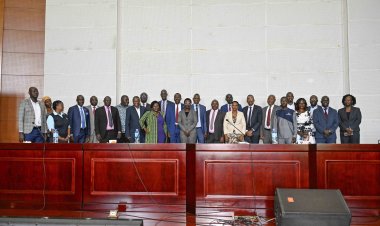FULL STATEMENT: Uganda Declared Ebola-Free

January 11th, 2023, marks 114 days since the start of the Ebola outbreak in Uganda, which was declared on the morning of 20th September 2022.
The outbreak started in Madudu subcounty, Mubende District and at the time of confirmation, several people had been infected and others with symptoms consistent with Ebola had died.
The outbreak was identified after an adult male, who later died, was managed at Mubende Regional Referral Hospital, and confirmed to have been infected with sudan Ebola virus disease.
Prior to this outbreak, Uganda had registered seven (7) previous Ebola outbreaks. o In 2018, Ebola Zaire cases were imported from the DRC into Kasese District, with 4 cases and 4 deaths registered. In 2012, two Sudan Ebola outbreaks occurred; Kibale district outbreak happened in July with 11 cases and 4 deaths while the Luwero district outbreak happened in November with 6 cases and 3 death.
In 2011, Sudan Ebola outbreak occurred in Luwero district. This was a one case and one death outbreak with no secondary transmission. In 2007, an outbreak occurred in Bundibugyo district (Bundibujjo Ebola outbreak) where 131 cases and 42 deaths were registered.
In 2000, Uganda’s first Ebola outbreak (sudan ebola outbreak) occurred in Gulu district, where 425 cases and 224 deaths were recorded. The Gulu outbreak was and remains the largest outbreak ever registered in Uganda which lasted for close to 6 months.
This outbreak marked the 7th Ebola outbreak in the country, and the 5th attributed to sudan Ebola virus, which was last reported in 2012, more than a decade ago in the then Kibaale district, but present day Kakumiro.
Brief outbreak description
A total of 143 confirmed cases of Ebola, with 22 probable cases, 55 deaths, and 87 recoveries have been registered in this outbreak. Of the 143 confirmed cases 85 (59%) were males while 58 (41%) females. By age, 26 (18%) were children while 117 (82%) were adults.
The outbreak started in Mubende district and was confirmed on September 19th, 2022. It then spread to Kassanda, Kyegegwa, Kagadi, Bunyangabu, Wakiso, Jinja, Masaka, and Kampala districts. Outside the epicentre district (Mubende), secondary transmission took place in Kassanda, Wakiso, Kampala, Kyegegwa, and Jinja.
Despite imported cases in Masaka, Bunyagabu, and Kagadi, there was no secondary transmission. There was sustained transmission in both Kassanda, and Mubende districts making the two, the epicentre districts.
The most affected district was Mubende, which is also the initial epicentre district of this outbreak, with 64 confirmed cases, and 29 deaths, followed by Kassanda district with 49 confirmed cases and 21 deaths. The records in other districts are as follows; Kampala City registered 18 cases and two (02) deaths, Kyegegwa registered four (04) cases and one (01) death, Wakiso registered three (03) cases and zero death, 4 Jinja registered two (02) cases and one (01) death, Kagadi registered one (01) case and (01) one death, Masaka registered one (01) case and one (01) death Bunyangabu registered one (01) case and no death (0).
The government of Uganda through the Ministry of Health and partners implemented several interventions which led to controlling the Ebola outbreak, a success we are celebrating today. These interventions include: Setting up an on-site Ebola testing mobile laboratory in Mubende district, where samples were picked, tested and results released within 6 hours.
Constructed 353 bed capacity treatment units in Mubende, Madudu, Kassanda, Mulago and Entebbe and equipped them with medical supplies and drugs. Trained over 2,339 health workers of different categories from both public and private facilities.
The healthcare workers were particularly trained in Infection Prevention and Control (IPC) against the deadly Ebola Sudan Virus Infection, Psychosocial support and care for both patients and affected families and enhanced clinical care for the ebola positive patient.
Enhanced the surveillance system in all affected district; listing and contact tracing for 21 days, daily follow up of all contacts and active case search in the affected districts. Carried out EVD Mortality surveillance (testing of all dead bodies for Ebola) in Kassanda, Mubende Masaka, Jinja, and Kampala districts. This was aimed at ensuring no unknown transmission chains were missed.
Restriction of movements in and out of the two districts of Mubende and Kassanda and an all-night curfew to control the spread of the virus to other districts. Quarantine of contacts for 21 days to avoid spread to others. This was especially useful in the urban areas of Kampala Metropolitan area and for resistant communities in Mubende district.
I am glad to note that these measures have worked, and we have successfully controlled the Ebola outbreak in Uganda. Moving forward, the Ministry of Health will continue to monitor the Ebola survivors and support them to re-integrate in the community.
I urge the population to remain vigilant and implement the standard operating procedures and report any person in the community that present with Ebola-like symptoms (e.g., sudden onset of fever, headache, weakness, join pains, vomiting, bloody diarrhoea or urine, bleeding from body openings) to the nearest health facility or call the Ministry of Health Toll Free Numbers.
My sincere gratitude to all the healthcare workers for their selfless and tireless efforts, dedication, and commitment to save lives end the Ebola outbreak
Declaration of Ebola Free Uganda
Having spent two incubation cycles of 21 days each, making a total of 42 days yesterday 10th January 2023, since the discharge of last confirmed case on 30th November 2022, having registered NO new Ebola case, despite sustained intense surveillance both at the epicentre districts and nationally, I now confirm that all transmission chains have been fully interrupted and take this opportunity to declare that the outbreak is over, and Uganda is now free of active Ebola transmission.
Hon Dr Aceng Jane Ruth Ocero (MP) MINISTER








